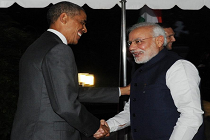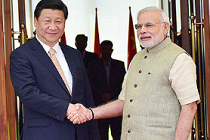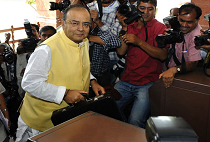 Courtesy: wikimediacommons
Courtesy: wikimediacommons
India faces heightened geoeconomic risks as the U.S. exits its unconventional monetary policy and the value of the dollar appreciates against major currencies. We can mitigate the risks with a multilateral safety net to provide liquidity, and by attracting FDI through the ‘Make in India’ programme
 Courtesy: wikimedia
Courtesy: wikimedia
India’s decision to block the Trade Facilitation Agreement at the World Trade Organisation in July was perplexing; the confusion was compounded because India was almost alone in its position. This policy perspective explains the reasons for India’s curious stand
 Courtesy: Ministry of External Affairs
Courtesy: Ministry of External Affairs
Prime Minister Narendra Modi’s visit to the U.S. is unlikely to reset bilateral relations. The relationship remains determined by bickering over trade and investment deals, such as the impasse at the WTO and the disputes over IPR. To become real strategic partners, both countries must move beyond these transactional exchanges
 Courtesy: MEA/Government of India
Courtesy: MEA/Government of India
Situated between the Xi-Modi bonhomie and border intrusions lies the growing divergence between India and China on food security and climate change. Both sides must address these issues urgently
 Courtesy:
Courtesy:
A post-visit analysis of Chinese President Xi Jinping's first official trip to India by Rajrishi Singhal, Senior Geoeconomics Fellow, Gateway House, was published in the Hindu Businessline
 Courtesy:
Courtesy:
Scroll published an article written by Rajrishi Singhal, Senior Geoeconomics Fellow, Gateway House, on how selling assets is a convenient way to balance the books for the year. But it does not solve the country's deep-rooted fiscal problems
 Courtesy:
Courtesy:
Rajrishi Singhal, Senior Geoeconomics Fellow, talks about how the government's plan to jettison this institution follows a series of other moves to get rid of symbols that bear the indelible mark of the country's first prime minister
 Courtesy: Associated Press
Courtesy: Associated Press
The debates and delays over the Goods and Services Tax exemplify how fiscal federalism is evolving through threats to its original design and rearguard action by states. Rebalancing the centre-state relationship is not easy, but an enlightened fiscal federalism is indispensable to keeping the republic together
 Courtesy: Economic Times
Courtesy: Economic Times
Rajrishi Singhal, Senior Geoeconomics Fellow, Gateway House in an article for Economic Times, examines the new Budget and how it is not easy to extirpate the old ways of doing business
 Courtesy: Ministry of Finance/GoI
Courtesy: Ministry of Finance/GoI
If Budget 2014 is used as a reference point to examine how closely the Modi government kept to its election promises, it is evidently not easy to extirpate the old ways of doing business. This is clear, for example, in the punitive capital gains tax rate on debt mutual funds. Budget 2015 must correct the anomalies












